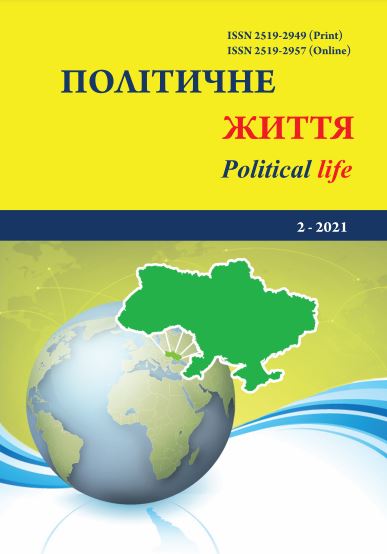The Institution of Monarchy as Guarantor of Transition to Democracy in Spain
DOI:
https://doi.org/10.31558/2519-2949.2021.2.3Keywords:
monarchy; transition to democracy; Juan Carlos I; francoism; “bunker”; military coupAbstract
The article dwells on the role, place and significance of the institution of monarchy represented by the king Juan Carlos I in the transition of Spanish society from almost 40 years of authoritarian dictatorship of F.Franco to a democratic constitutional monarchy. The emphasis is placed on the fact that the model of Spanish transition to democracy is considered to be paradigmatic, and it has been tried and tested in a number of countries. The political, socio-economic, legal and regional prerequisites of the peaceful dismantlement of francoism have been studied. A particular focus has been put on the development of the personality of the Spanish monarch, Juan Carlos I, as a liberal, driving force and guarantor of democratic reforms, on h3is ability to select and keep within his orbit politicians and intellectuals, advocates for democratic change, and communicate with different sectors of the Spanish politics; on his political instinct, determination, consistency, responsibility and courage. The use of extensive factual material from the most recent Spanish sources justified the conclusion that the institution of monarchy restored in Spain in 1976 proved to be crucial for reconciliation of differently vectored political groups and parties, including communists and socialists. This was accomplished through negotiations and the signing of the pact of national unity (the Moncloa Pacts). The king acted as the initiator and guarantor of irreversible, peaceful and legal transition of Spain to democracy. The article highlights the decisive and exceptional role of Juan Carlos I in keeping down the military coup attempted with a view to eliminating democratic changes and returning the country to authoritarian rule, which occurred in February 1981. It led to the appearance and and spreading of the so-called Juancarlism (i.e. respect and admiration for the figure of the Spanish monarch) in the Spanish society. The article traces the evolution of the institution of monarchy in Spain: from absolute and authoritarian to constitutional, parliamentary and democratic. It emphasizes the progressive role of monarchical system in the current context.
References
Хантингтон С. Третья волна. Демократизация в конце ХХ века. /Пер. с англ. М.: РОССПЭН, 2003. 368 с.
Романюк О.І. Що таке «дефектні демократії» і якими вони бувають. Вісник Національного університету «Юридична академія України імені Ярослава Мудрого. 2017. №2 (33). с.114-123.
Marin Jose Maria, Molinero Carme, Ysas Pere. Historia politica de España 1939-2000. Madrid: Ediciones Istmo, S.A., 2001. 511 p.
Historia de España siglo XX. 1939-1996 // Coopd. Martinez Jesus A. Madrid: Catedra, 2003. 519 p.
Preston Paul. Juan Carlos. Steering Spain Dictatorship to Democracy. New York-London: W.W.Norton& Compani, 2004. 614 p.
Borras Betriu Rafael. Los ultimos Borbones. De Don Alfonso ХІІІ al Principe Felipe. Barcelona: Flor del Viento Ediciones, S.A., 1999. 490 p.
Іваницька О.П. Іспанія у ХХ-ХХІ сторіччях: монографія. Вінниця: ТОВ «Нілан-ЛТД», 2017. 600 с.
Хенкин С.М. Хуан Карлос І: политический портрет. М.:РАН ИНИОН, 2003. 92 с.
Хосе Луис де Вилальонга. Король. Беседы с королем Испании доном Хуаном Карлосом І. М.: Диопринт, 2003. 304 с.
Powell T. Charles. Juan Carlos. Un Rey para la Democracia. Barcelona: Planeta, 1995. 430 p.
Испанские короли /Под ред. Бернекера В.Л., Карлоса Кальядо Сейделя и Пауля Хозера. Ростов-на-Дону: Феникс,1998, 510 с.
Пожарская С.П. Бурбоны в Испании. Новая и новейшая история. Москва. 1993. №1. с.153-170.
Peñafiel Jaime. Juan Carlos y Sofia. Retrato de un matrimonio. Madrid: La Esfera de los Libros, S.L., 2008. 256 p.
Garcia Abad Jose- La Soledad del Rey. Madrid: La Esfera de los Libros, S.L., 2004. 490 p.
Quintans Rebeca. Juan Carlos І. La biografia sin silencios. – Argentina/ España/ Mexico: AKAL, 2016. 735 p.
Іваницька О.П. Хуан Карлос І: шлях до корони: монографія. Вінниця: ТОВ «ТВОРИ», 2019. 360 с.
Годлевська В.Ю. Реставрація монархії як фактору консолідації та стабільності іспанського суспільства в період постфранкізму (1975-1982 рр.) Наукові зваиски Вінницького державного педагогічного університету імені Михайла Коцюбинського. Серія : Історія. Вип.4. 2002. с. 208-2011.
Матлай Л.С. Його Величність король Іспанії Хуан Карлос І: унікальність поновлення європейської монархії у ХХ столітті. Наукові записки історичного факультету Запорізького національного університету. Вип. ХХІХ. 2010. с. 362-366.
Sabin Rodriguez Jose Manuel. La Dictadura franquista (1936-1975). Textos y documentos. Madrid: AKAL,1997. 449 p.
Гарсиа Хосе. Испания ХХ века. М.: Мысль, 1967. 486 с.
Давыдов В.М. Испания: траектория модернизации на исходе двадцятого века. М.: ИЛА РАН, 2006. 504 с.
Benito Alarcon Juan. Francisco Franco y su tiempo. Madrid: Edisiones fraile, S.A., 1983. 237 p.
Bennassar Bartolome. Franco. Madrid: EDAF, 1996. 367 р.
Equipo Cinco. Franco diferente. Diez perfiles historicas. Madrid Editorial Fenix S.L., 1996. 435 p.
Oneto Jose. 100 dias en la muerte de Francisco Franco. Madrid: El Pais, 1975. 268 p.
Pozuelo Escudero Vicente. Los ultimos 476 dias de Franco. Madrid: Imp. Foresa, 1980. 253 p.
Fusi Juan Pablo. Franco. Spanien unter der Diktatur. 1936-1975. Madrid: Edisiones RIAZP, 2001. 238 p.
Іваницька О.П. Альфонсо ХІІІ – король парадоксів. Чернівці: Книги – ХХІ, 2006. 231 с.
Іваницька О.П. Пізній франкізм: особливості та наслідки трансформації. Вісник Київського міжнародного університету. Серія: міжнародні відносини. Вип.4. 2005. с.89-98.
История Испании. В 2-х т. Москва: «Индрик», 2014. Т.2. От войны за испанское наследство до начала ХХІ века. 871 с.
Волкова Г.И. Политическая история Испании ХХ века. Москва: «Высшая школа», 2005. 191 с.

